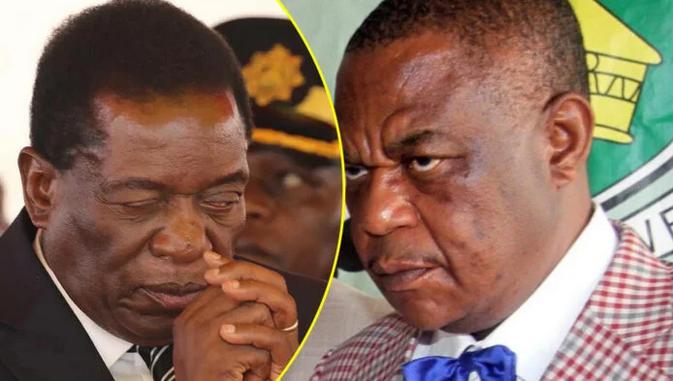News / National
Mnangagwa's Zimbabwe: Speak out, get jailed
12 Sep 2025 at 10:01hrs |
17 Views

In a chilling echo of Zimbabwe's authoritarian past, a Bindura man was recently jailed for allegedly insulting President Emmerson Mnangagwa and Vice President Constantino Chiwenga. According to court documents, Antony Sande, aged 42, was charged under Section 33(2)(b) of the Criminal Law (Codification and Reform) Act for making "obscene statements" about the President - statements deemed likely to "engender feelings of hostility" or "ridicule" of the head of state.
The incident, which unfolded at Foothills Farm on 27 February 2023, involved Sande publicly accusing Mnangagwa of "selling out the country" and claiming Chiwenga was the de facto ruler. The remarks, made in the presence of others, were swiftly met with arrest and prosecution. Sande now joins a growing list of Zimbabweans penalised for political speech - despite constitutional guarantees of freedom of expression.
Mnangagwa vs. Mugabe: A Legacy Repeated
When Mnangagwa succeeded Robert Mugabe in 2017, many hoped for a democratic reset. Mugabe's 37-year rule was infamous for its intolerance of dissent, with dozens arrested for allegedly insulting him - including journalists, activists, and even ordinary citizens who dared to joke about his age or policies.
But Mnangagwa's administration has not broken from that legacy. In fact, human rights watchdogs say the use of Zimbabwe's "insult law" has intensified. According to Satori News, over 40 cases have been recorded in just two years, with citizens jailed for statements as mild as calling ruling party members "thieves" or expressing support for opposition leaders.
Terrence Mkhwananzi, a Bulawayo activist, was charged in 2018 for pointing at Mnangagwa's portrait and blaming him for his father's death during the Gukurahundi massacres. "At least with Mugabe, we knew he was brutal," Mkhwananzi told NPR. "Mnangagwa came in pretending to be democratic - but there is no democracy in this country."
A Law That Silences, Not Protects
Section 33(2)(b) was originally crafted to shield the dignity of the presidency. But critics argue it's now weaponized to suppress dissent and intimidate critics. The law criminalizes any statement that "undermines the authority" of the President - even if it's rooted in political opinion or satire.
In the case of Antony Sande, the court report reveals not just the charge, but the broader climate of fear. Sande was allegedly assaulted by a police officer before his arrest, and threatened with disappearance - an ominous reference to another individual named Mangwanguwa. The message was clear: speak out, and you may vanish.
International Spotlight, Local Silence
Zimbabwe's constitution guarantees freedom of expression under Section 61. Yet, the continued enforcement of insult laws contradicts both domestic and international human rights standards, including Article 19 of the Universal Declaration of Human Rights.
As elections loom and political tensions rise, the question remains: will Mnangagwa's government embrace reform—or continue down the path of repression paved by his predecessor?
For now, the answer seems written in handcuffs.
The incident, which unfolded at Foothills Farm on 27 February 2023, involved Sande publicly accusing Mnangagwa of "selling out the country" and claiming Chiwenga was the de facto ruler. The remarks, made in the presence of others, were swiftly met with arrest and prosecution. Sande now joins a growing list of Zimbabweans penalised for political speech - despite constitutional guarantees of freedom of expression.
Mnangagwa vs. Mugabe: A Legacy Repeated
When Mnangagwa succeeded Robert Mugabe in 2017, many hoped for a democratic reset. Mugabe's 37-year rule was infamous for its intolerance of dissent, with dozens arrested for allegedly insulting him - including journalists, activists, and even ordinary citizens who dared to joke about his age or policies.
But Mnangagwa's administration has not broken from that legacy. In fact, human rights watchdogs say the use of Zimbabwe's "insult law" has intensified. According to Satori News, over 40 cases have been recorded in just two years, with citizens jailed for statements as mild as calling ruling party members "thieves" or expressing support for opposition leaders.
Terrence Mkhwananzi, a Bulawayo activist, was charged in 2018 for pointing at Mnangagwa's portrait and blaming him for his father's death during the Gukurahundi massacres. "At least with Mugabe, we knew he was brutal," Mkhwananzi told NPR. "Mnangagwa came in pretending to be democratic - but there is no democracy in this country."
Section 33(2)(b) was originally crafted to shield the dignity of the presidency. But critics argue it's now weaponized to suppress dissent and intimidate critics. The law criminalizes any statement that "undermines the authority" of the President - even if it's rooted in political opinion or satire.
In the case of Antony Sande, the court report reveals not just the charge, but the broader climate of fear. Sande was allegedly assaulted by a police officer before his arrest, and threatened with disappearance - an ominous reference to another individual named Mangwanguwa. The message was clear: speak out, and you may vanish.
International Spotlight, Local Silence
Zimbabwe's constitution guarantees freedom of expression under Section 61. Yet, the continued enforcement of insult laws contradicts both domestic and international human rights standards, including Article 19 of the Universal Declaration of Human Rights.
As elections loom and political tensions rise, the question remains: will Mnangagwa's government embrace reform—or continue down the path of repression paved by his predecessor?
For now, the answer seems written in handcuffs.
Source - Byo24News
Join the discussion
Loading comments…


































